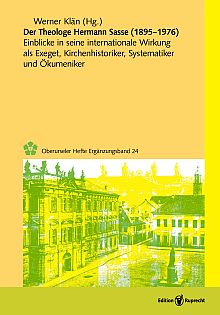Rezension
Concordia Theological Quarterly 85 (2021)
This volume, published in celebration of Hermann Sasse’s 125th birthday (Sasse was born July 17, 1895), is a collection of essays by scholars from Australia, Germany. Canada, and the United States, some in German, some in English, each followed helpfully by a one-paragraph summary in the alternate language. Werner Klän’s introduction and Andrea Grünhagen’s closing biographical summary both include the following quote from the preface to Sasse’s In Statu Confessionis: »Bekenntnistreue und echte Ökumenizität gehören zusammen« (»Confessional fidelity and genuine ecumenism go hand in hand,« 9, 230). This could be taken as thematic for the volume as a whole. Each of the essays in its own way explores how Sasse maintained confessional fidelity through rigorous engagement with the Scriptures and with the history of the church, sometimes in bold opposition to the specter of totalitarianism. Never being content to hoard the divine riches of the word of God for his own little corner of Christendom, Sasse labored to call all Christians of every stripe throughout the world to embrace the universal truth of the word he confessed. The Lutheran confession is for all Christendom.
The essays by Volker Stolle (11−49), Simon Volkmar (50−71), and John Stephenson (132−146) explore Sasse’s exegetical legacy, where he has proven most controversial among Missouri Synod Lutherans. Stephenson takes a number of surprising potshots at the heirs of the Synodical Conference without providing much by way of constructive alternatives to what he sees as failings in their approach to inspiration and ecumenism. Thomas Winger (72−88) delves into the nature of confession itself as Sasse understood it, concluding, in keeping with the theme of the volume, that from this understanding flows »the necessity of confessing firmly the full Scriptural truth of the Gospel and Sacraments that make the church one; and the imperative to seek unity (concord), which drove Sasse into a lifetime of ecumenical labour« (88). The essays by Christian Neddens (89−102), Wolfgang Sommer (103−115) and Maurice Schild (121−132) deal with Sasse’s response to National Socialism of special relevance to the church of our own day, when Romans 13 can serve as a cloak for cowardice in the face of secularism’s attempt to stamp out Christianity and even basic morality in the public sphere, is SchiId’s summary of Sasse’s perhaps surprising position on resistance to the state: »A regime which undermines the basic orders of justice, marriage and the family forfeits authority as a goverment; and … any obligatory duty to obey such a power then no longer exists … A church acknowledging a regime of this type as government … would make itself ›guilty of a grievous sin‹ … Insurrection (Empörung) against such a power would constitute not revolution but rather a war of defense (Notwehr) legitimated by the emergency situation« (128−129). This is no quietism. Here Sasse’s commitment to bold confession leads to the real possibility of actually having to suffer for that confession, a possibility that is becoming ever more real for us. Matthew Harrison (147−165), Jacob Corzine (166−187), Werner Klän (188−212) and John Pless (213−229) focus on Sasse’s study of the Office of the Ministry, ecclesiology, and the Lord’s Supper in light of his commitment to genuine ecumenism. Pless, summarizing again the theme of the volume, writes in his essay »Sasse maintains that Lutherans have the obligation to the una sancta to test their doctrine by Scripture and then joyfully to confess and proclaim this truth« (225). Finally, Volker Stolle, in a second contribution (116−120), and Andrea Grünhagen (230−246) provide essays of biographical interest.
All in all, this is a useful, enjoyable volume that will lead to deepened interest in perhaps the most significant confessional Lutheran figure of the twentieth century, a figure who has much to teach us still about the genuinely ecumenical thrust of faithful Lutheran confession.
Christopher Neuendorf








